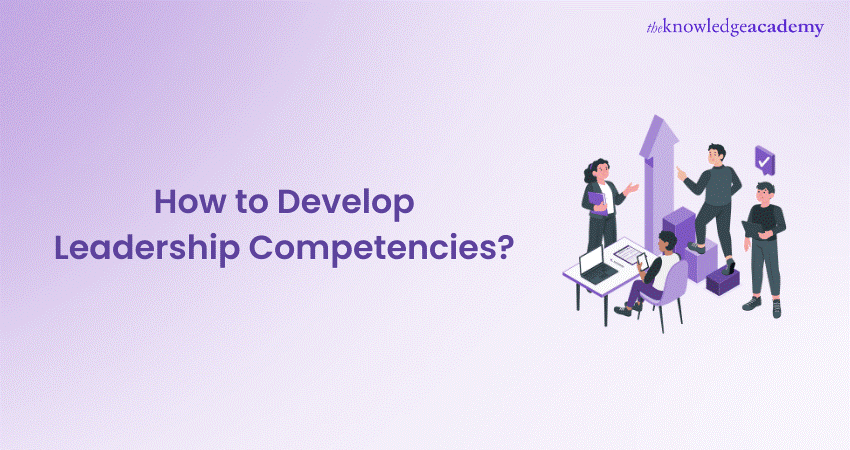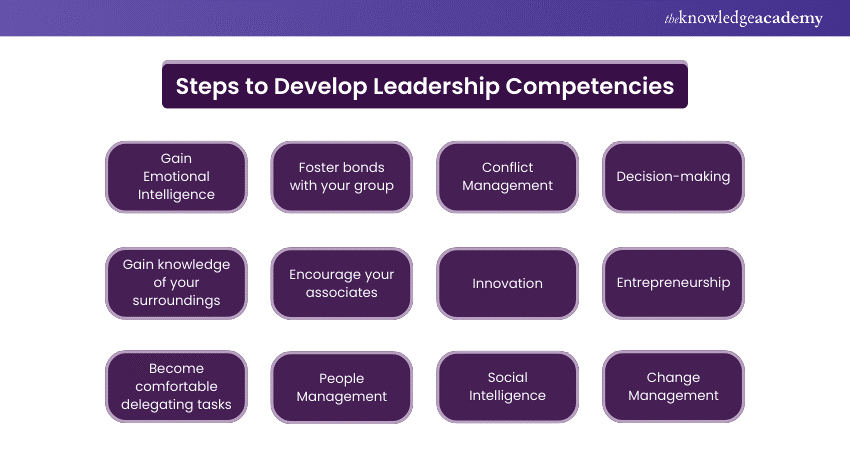We may not have the course you’re looking for. If you enquire or give us a call on 01344203999 and speak to our training experts, we may still be able to help with your training requirements.
Training Outcomes Within Your Budget!
We ensure quality, budget-alignment, and timely delivery by our expert instructors.

Have you ever wondered How to Develop Leadership Competencies? In this detailed blog, we will uncover the secrets behind effective Leadership. From mastering Emotional Intelligence to fostering innovation, we will discuss the actionable steps and strategies to help you become a proficient Leader. So, fasten your seatbelt and get ready to dive deep on an exciting adventure towards Leadership excellence.
Table of Contents
1) How to Develop Leadership Competencies?
a) Gain Emotional Intelligence
b) Foster bonds with your group
c) Conflict Management
d) Decision-making
e) Gain knowledge of your surroundings
f) Encourage your associates
g) Innovation
h) Entrepreneurship
i) Become comfortable delegating tasks
j) People Management
2) Conclusion
How to Develop Leadership Competencies?
Strong Leadership is essential for success in today's dynamic and competitive business environment. Let’s explore the 12 essential competencies and actionable strategies to hone your Leadership Skills.

1) Gain Emotional Intelligence
Effective Leadership relies on Emotional Intelligence, which entails both self-awareness and empathy. This skill involves not only understanding and managing your own emotions but also connecting with and understanding the emotions of others.
Developing Emotional Intelligence requires self-awareness, self-regulation, social awareness, and relationship management. Practising active listening, empathy, and recognising and regulating emotions are essential steps in enhancing Emotional Intelligence.
2) Foster bonds with your group
Establishing robust connections with your team members is vital for successful Leadership. Cultivate a culture where trust, respect, and transparent communication flourish. Get to know your team on a personal level, show genuine interest in their well-being, and actively listen to their concerns and ideas. Encourage collaboration and teamwork and create opportunities for team bonding activities.
3) Conflict Management
Conflicts are a natural part of any workplace, yet efficient Leaders possess the skills to handle them positively and productively. Develop skills in conflict resolution by staying calm and objective, listening to all parties involved, identifying common ground, and facilitating mutually beneficial solutions. Promote open discussions and set up transparent communication pathways to swiftly tackle conflicts and prevent them from escalating.
4) Decision-making
Leadership often involves making difficult choices amidst challenges. Strengthen your decision-making abilities by gathering pertinent data, evaluating options, weighing risks and rewards, and seeking input from important stakeholders. Strive for well-informed and timely decisions that align with organisational goals and values.
Elevate your career with our comprehensive Successful People Management And Team Leadership Course - join today!
5) Gain knowledge of your surroundings
A successful Leader is knowledgeable about their industry, market trends, and organisational context. Stay informed by continuously learning and staying abreast of developments in your field. Engage in professional development opportunities, network with peers, and seek feedback from mentors and industry experts to broaden your understanding of your surroundings.
6) Encourage your associates
Great Leaders ignite and energise their team to reach their utmost capabilities. Acknowledge and value their efforts, offer helpful feedback, and cultivate a supportive atmosphere conducive to development and creativity. Empower your colleagues by entrusting them with tasks and encouraging them to tackle new challenges.
Get an in-depth knowledge of various Leadership styles with our Leadership Courses.
7) Innovation
Leadership involves promoting creativity and embracing change. Cultivate an innovative culture by fostering experimentation, encouraging idea generation, and questioning conventional approaches. Establish a supportive atmosphere where team members feel empowered to share insights and take measured risks, fostering innovation and ongoing enhancement.
8) Entrepreneurship
Effective Leaders exhibit entrepreneurial traits such as vision, initiative, and risk-taking. Cultivate an entrepreneurial mindset by thinking strategically, identifying opportunities for growth and innovation, and taking calculated risks to achieve organisational objectives. Embrace innovation, adaptability, and a proactive approach to driving positive change and seizing new opportunities.
9) Become comfortable delegating tasks
Delegation is important for effective Leadership and team productivity. Learn to trust your team members and delegate tasks according to their skills, strengths, and interests. Clearly communicate expectations, offer support, and empower your team to take charge of their responsibilities. Delegation allows you to focus on strategic priorities while fostering autonomy and growth among team members.
10) People Management
People Management entails understanding and effectively leading individuals and teams to achieve organisational goals. This involves skills such as communication, conflict resolution, motivation, and team building. To develop People Management competencies, Leaders can focus on improving communication skills to convey expectations clearly. They can also actively listen to team members' concerns and provide constructive feedback.
They should also learn conflict resolution techniques to address disputes amicably and foster a positive work environment. Additionally, developing the ability to motivate and inspire team members through recognition, empowerment, and delegation is essential for effective People Management.
11) Social Intelligence
It is the ability to understand and navigate social situations adeptly, including interpreting social cues, building rapport, and fostering relationships. Leaders can develop Social Intelligence by practising active listening, empathy, and Emotional Intelligence. It includes understanding oneself and others' emotions, which facilitates better communication and relationship-building.
Leaders should also work on building rapport and trust with team members by demonstrating authenticity, integrity, and transparency in their interactions. By cultivating Social Intelligence, Leaders can create a supportive and collaborative work environment conducive to achieving shared objectives.
12) Change Management
Change Management is crucial for Leaders to navigate transitions, whether it involves implementing new processes, technologies, or organisational restructuring. Developing Change Management competencies involves skills such as strategic planning, communication, resilience, and stakeholder engagement.
Leaders should learn to create a compelling vision for change, communicate it effectively to stakeholders, and address resistance by fostering a culture of openness and adaptability. Additionally, Leaders should prioritise building resilience in themselves and their teams to navigate setbacks and challenges during change initiatives. By mastering Change Management, Leaders can successfully lead their organisations through periods of transformation and achieve desired outcomes.
Developing core Leadership Competencies is an ongoing journey that requires dedication, self-reflection, and continuous improvement. By mastering these essential skills and strategies, you can become a more effective and influential Leader, driving positive change and achieving success in your personal and professional endeavours.
Conclusion
Now that you have discovered How to Develop Leadership Competencies, it's time to put these strategies into action. Remember, Leadership is a journey of continuous growth and learning. By following these strategies and fostering a culture of empowerment, innovation, and collaboration, you can become an efficient and inspiring Leader. With dedication and perseverance, you can unlock your full potential and make a positive impact on those around you. Let's continue to nurture our Leadership skills and make a lasting impact together.
Inspire and motivate your team and drive success with our Creative Leaders Training. Join today!
Frequently Asked Questions

To achieve Leadership Competencies, focus on building skills like communication, decision-making, and teamwork through practice and learning.

To develop a Leadership competency framework, identify key skills and behaviours needed for Leadership roles, and create guidelines for assessing and developing these competencies within your organisation.

The Knowledge Academy takes global learning to new heights, offering over 30,000 online courses across 490+ locations in 220 countries. This expansive reach ensures accessibility and convenience for learners worldwide.
Alongside our diverse Online Course Catalogue, encompassing 17 major categories, we go the extra mile by providing a plethora of free educational Online Resources like News updates, Blogs, videos, webinars, and interview questions. Tailoring learning experiences further, professionals can maximise value with customisable Course Bundles of TKA.

The Knowledge Academy’s Knowledge Pass, a prepaid voucher, adds another layer of flexibility, allowing course bookings over a 12-month period. Join us on a journey where education knows no bounds.

The Knowledge Academy offers various Leadership Courses, including Leadership Skills, Introduction to Supervising a Team, and Successful People Management and Team Leadership Courses. These courses cater to different skill levels, providing comprehensive insights into various Leadership Styles.
Our Business Skills Blogs cover a range of topics related to Leadership, offering valuable resources, best practices, and industry insights. Whether you are a beginner or looking to advance your Leadership skills, The Knowledge Academy's diverse courses and informative blogs have you covered.
Upcoming Business Skills Resources Batches & Dates
Date
 Leadership Skills Training
Leadership Skills Training
Fri 27th Dec 2024
Fri 28th Feb 2025
Fri 11th Apr 2025
Fri 27th Jun 2025
Fri 22nd Aug 2025
Fri 24th Oct 2025
Fri 12th Dec 2025







 Top Rated Course
Top Rated Course



 If you wish to make any changes to your course, please
If you wish to make any changes to your course, please


